2024 McLeod Summer Award Recipients
Maria Ingersoll, Biology PhD candidate in the Davies and Gilmore Labs, and Mu-Han Chen, a Biology PhD student in the Davies Lab, received the 2023 McLeod Summer Award.
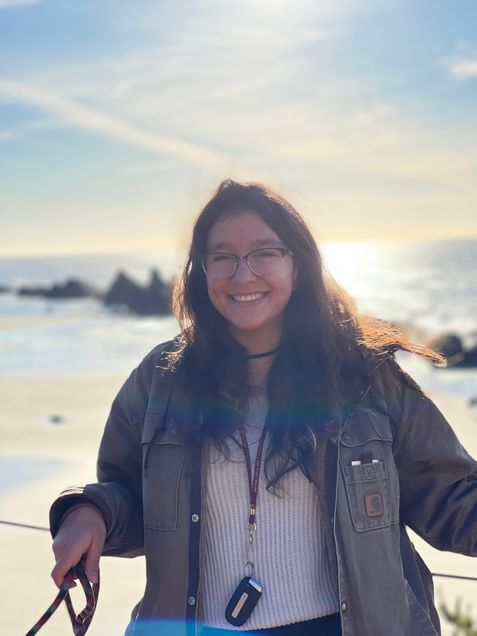 Maria studies the immune system of cnidarians, including coral and sea anemones, specifically in reference to their symbiosis with a photosynthetic algae that lives inside of their gastrodermal cells. Her research leverages a combination of next-generation sequencing, molecular biology, and environmentally relevant susceptibility analyses to perform the following: 1) characterize the influence of symbiosis and starvation on gene expression and stress response programming in the sea anemone E. pallida (Valadez-Ingersoll et al., ProcB 2024), 2) use single-cell RNA sequencing and proteomics to develop an atlas of cell-type composition and gene expression across symbiotic states in the coral O. arbuscula, and 3) use Split Pool Ligation-based Transcriptome sequencing and targeted molecular assays to uncover the molecular specificity of the host immune system for specific symbiont strains in E. pallida.
Maria studies the immune system of cnidarians, including coral and sea anemones, specifically in reference to their symbiosis with a photosynthetic algae that lives inside of their gastrodermal cells. Her research leverages a combination of next-generation sequencing, molecular biology, and environmentally relevant susceptibility analyses to perform the following: 1) characterize the influence of symbiosis and starvation on gene expression and stress response programming in the sea anemone E. pallida (Valadez-Ingersoll et al., ProcB 2024), 2) use single-cell RNA sequencing and proteomics to develop an atlas of cell-type composition and gene expression across symbiotic states in the coral O. arbuscula, and 3) use Split Pool Ligation-based Transcriptome sequencing and targeted molecular assays to uncover the molecular specificity of the host immune system for specific symbiont strains in E. pallida.
Her research provides a substantive contribution to the fields of evolution (characterizing immune systems in basal Metazoa), cell biology (describing the transcriptomic profiles of cell types in previously unexplored taxa), and conservation biology (informing how cnidarian holobionts respond to environmental stress).
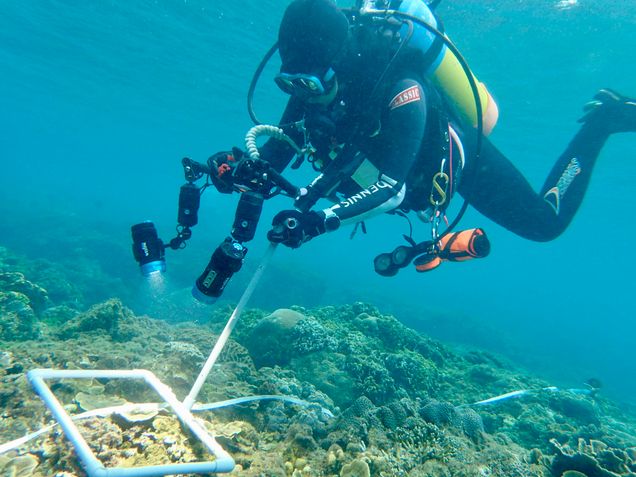 Mu-Han’s proposed research aims to identify functional interactions between Symbiodiniaceae and bacteria, further exploring their collective impacts on the coral host response to environmental change. She will leverage recent advancements in transcriptomics, metabolomics, and NanoSIP imaging techniques to gain a comprehensive understanding of Symbiodiniaceae-bacteria interactions within coral holobionts.
Mu-Han’s proposed research aims to identify functional interactions between Symbiodiniaceae and bacteria, further exploring their collective impacts on the coral host response to environmental change. She will leverage recent advancements in transcriptomics, metabolomics, and NanoSIP imaging techniques to gain a comprehensive understanding of Symbiodiniaceae-bacteria interactions within coral holobionts.
To address this overarching objective, she will use the sea anemone Aiptasia (Exaiptasia pallida) and its endosymbiotic Symbiodiniaceae as a model system for cnidarian-dinoflagellate symbiosis. Building upon this Aiptasia-Symbiodiniaceae framework, she aim to integrate bacteria to create a more complex system encompassing cnidarian-symbiont- bacteria interactions. In the upcoming summer of 2024, her primary focus will be on characterizing ex hospite interactions between free-living Symbiodiniaceae and their associated bacteria. She will examine variation in symbiont physiology, microbial composition, and gene expression profiles between axenic Symbiodiniaceae strains and their xenic counterparts.
Results of her proposed research will elucidate the intricate interplay among microscopic symbiotic partners within the cnidarian holobiont. These endeavors hold the potential for invaluable insights, reshaping our understanding of symbiosis with potential future applications for bioengineering in corals, particularly in light of challenges posed by climate change.
The Warren-McLeod Graduate Fellowship in Marine Science was established by Patricia Warren (the granddaughter of BU’s 1st President, William Fairfield Warren) in 1990 to support graduate students in the BU Marine Program (BUMP). Guy McLeod was Patricia’s brother-in-law and the long-time director of research at the New England Aquarium. He was a marine biologist, whose scholarship focused on the role of iron, vanadium, and other metal ions on the physiological ecology of marine animals.
Congratulations Maria and Mu-Han!
Mandy Pinheiro Receives Belamarich Dissertation Writing Award
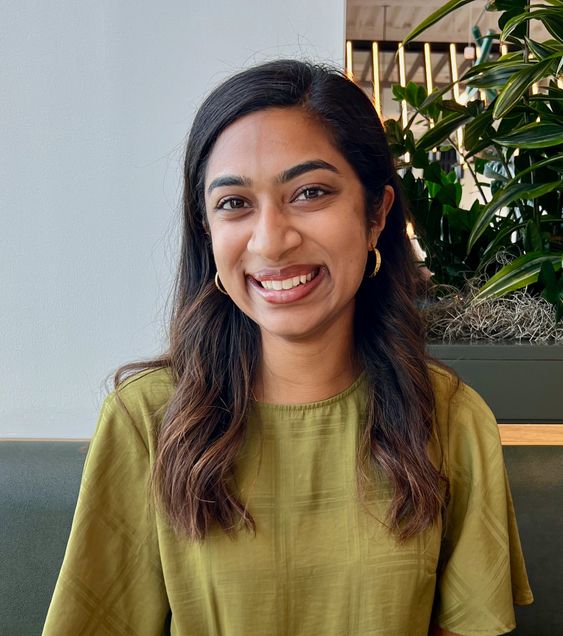 Mandy Pinheiro, an MCBB PhD candidate in the Naya Lab, received the Belamarich Dissertation Writing Award. This award complements the Belamarich Award, and is given to support an outstanding PhD student through the dissertation writing stage.
Mandy Pinheiro, an MCBB PhD candidate in the Naya Lab, received the Belamarich Dissertation Writing Award. This award complements the Belamarich Award, and is given to support an outstanding PhD student through the dissertation writing stage.
Mandy’s research focuses on understanding how noncoding RNAs (ncRNAs) may be central to the coordination of metabolism and differentiation in skeletal muscle. The regulation of gene expression during cell state transitions is a complex and tightly controlled molecular process. One potential central regulator of myogenesis is the Dlk1-Dio3 ncRNA locus, the largest known mammalian cluster of ncRNAs. She used mouse skeletal muscle cells as a model system to investigate how this ncRNA cluster may coordinate metabolic and epigenetic changes that occur when proliferating myoblasts differentiate into mature myotubes.
Congratulations, Mandy!
Jaice Rottenberg Receives Charles Terner Award
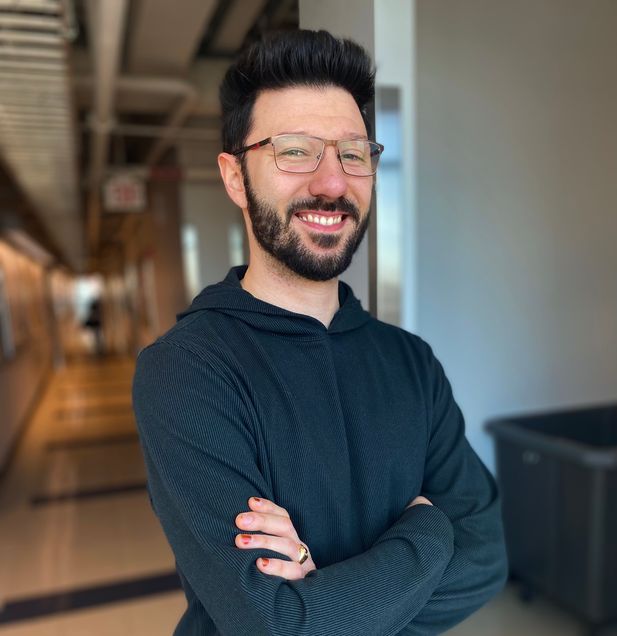 Jaice Rottenberg, a fifth-year CM Ph.D. student in the Fuxman Bass Lab, received the 2024 Charles Terner Award. His lab studies the role of transcriptional regulation in a wide variety of biological processes including development, immune regulation, cancer, and viral infection. His project explores the mechanisms by which human-infecting viruses manipulate the host cellular environment to replicate and survive. Specifically, he is investigating the impact of viral-encoded proteins on host signaling pathways and gene expression.
Jaice Rottenberg, a fifth-year CM Ph.D. student in the Fuxman Bass Lab, received the 2024 Charles Terner Award. His lab studies the role of transcriptional regulation in a wide variety of biological processes including development, immune regulation, cancer, and viral infection. His project explores the mechanisms by which human-infecting viruses manipulate the host cellular environment to replicate and survive. Specifically, he is investigating the impact of viral-encoded proteins on host signaling pathways and gene expression.
This award provides support for a CM or MCBB PhD candidate who has made significant contributions to their field. Charles Terner was a Professor of Biology at Boston University for over 20 years before he retired in 1985. Dr. Terner specialized in biochemistry and focused his research on the metabolic properties of male reproductive cells. The award was established in his memory after he passed away in 1998.
Congratulations, Jaice!
E Schlatter Receives 2024 Economakis Award
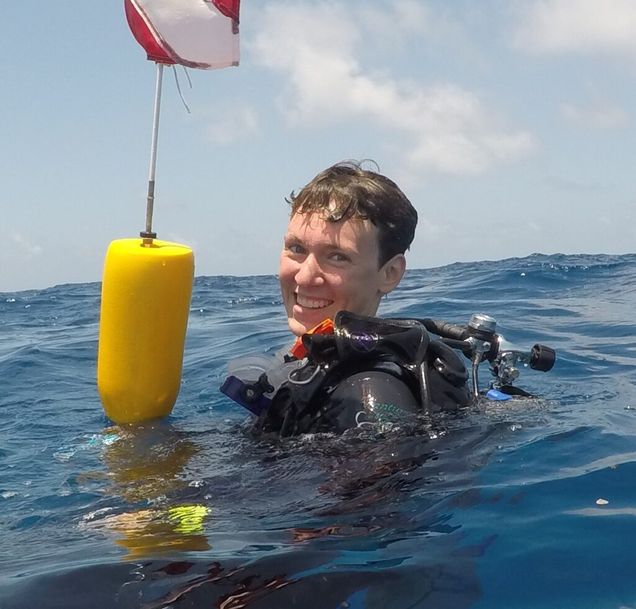 E Schlatter of the Buston Lab received the 2024 Alistair Economakis Award in Marine Science. This award provides support for graduate students conducting research in marine science with a focus on research related to ecology, evolution, or behavior.
E Schlatter of the Buston Lab received the 2024 Alistair Economakis Award in Marine Science. This award provides support for graduate students conducting research in marine science with a focus on research related to ecology, evolution, or behavior.
In their study, E uses a variety of theoretical and empirical approaches to address questions about the evolution of marine larval dispersal. Their current projects include: using quantitative genetics to ask about the evolutionary potential of dispersal-related traits in the clownfish Amphiprion percula; using a theoretical model to illustrate the roles of opposing components of selection in shaping dispersal patterns; and using genetic simulations and seascape information to create a quantitative link between empirical measures of dispersal and the resulting spatial genetic structure in the neon goby Elacatinus lori.
As a whole, this work contributes to our understanding of how and why organisms have evolved to disperse through the ocean as they do.
Congratulations, E!
Garcia-Marcos Lab work featured in new publication in Cell
The Garcia-Marcos Lab has recently published the development and implementation of a suite of G protein biosensors broadly applicable to detect GPCR activity in scalable assay formats and in physiologically relevant systems like primary cells. By directly measuring endogenous GPCR activity, these biosensors, named ONE-GO, reveal that responses are frequently dependent on the cell context or state. This resource article has been published in the journal Cell and all related plasmid reagents are deposited in Addgene. The work in this paper was led by current PhD student Remi Janicot and former postdoc Marcin Maziarz, and includes collaborations with the Layne Lab in the Department of Biochemistry & Cell Biology, and the Wu lab at Stanford.

Congratulations to the Garcia-Marcos Lab!
Dr. Meg Younger Receives 2024 Sloan Research Fellowship
Three Boston University researchers have been named 2024 Sloan Research Fellows, a competitive award given annually to early-career researchers across a range of scientific disciplines. Among one of the three recipients is neurobiologist Dr. Meg Younger, in the Biology Department.
Since 1955, 59 faculty from BU have received a Sloan Research Fellowship, including this year’s winners. Fellows each receive $75,000 to be spent over two years on any expense to support their research. The foundation says fellows are chosen, in part, for their “potential to revolutionize their fields of study”; winners are selected by committees of distinguished scientists from their respective fields.
Dr. Meg Younger: How well can mosquitoes smell?
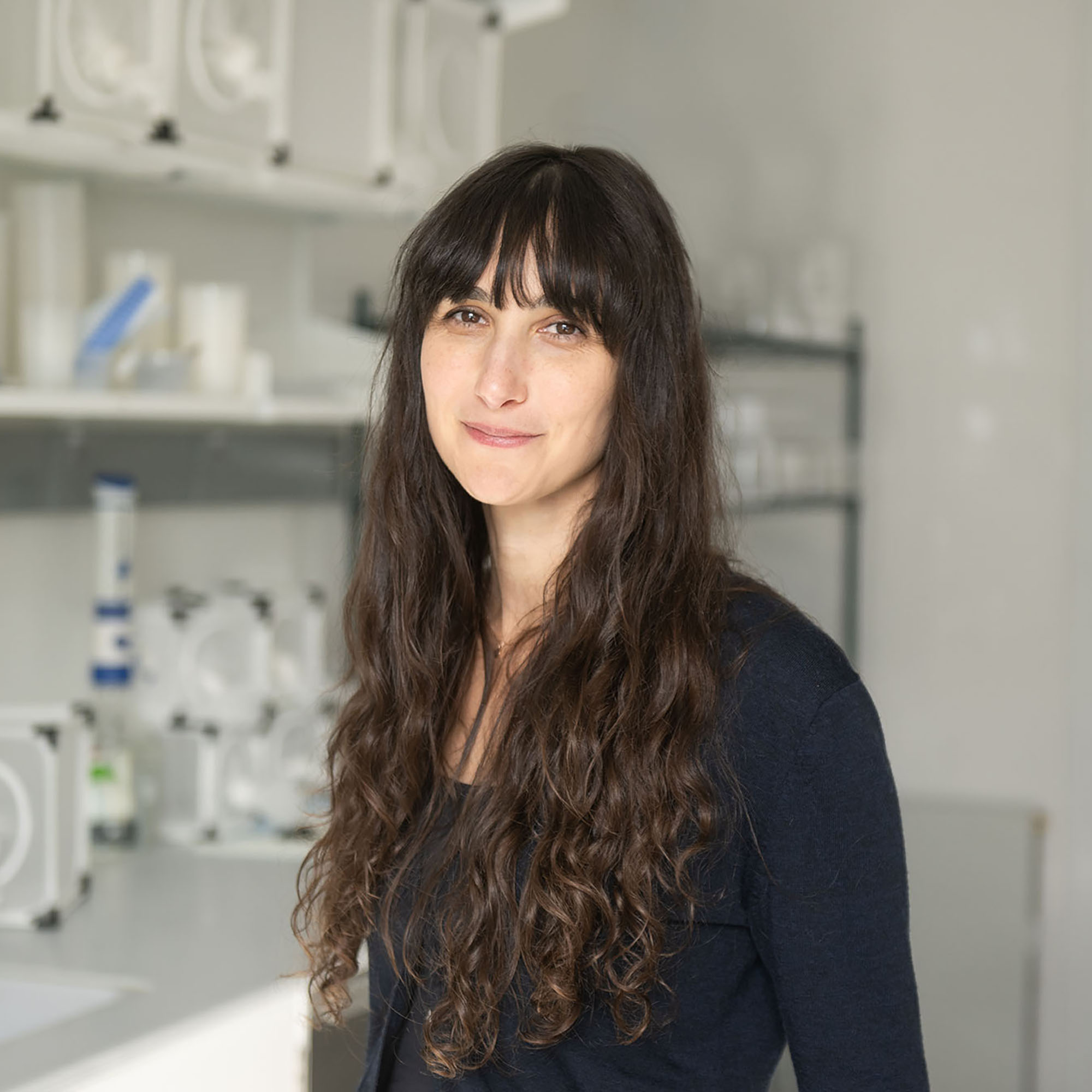
Dr. Meg Younger, a CAS assistant professor of biology, studies how mosquitoes use their sense of smell when looking for a person to bite. Her lab focuses on the Aedes aegypti, mosquitoes that spread numerous diseases like dengue fever, yellow fever, and Zika virus.
“I am excited to make discoveries that advance our understanding of the chemical senses,” Younger says. “Especially in the mosquito olfactory system, because of the relevance to global health, but also to learn how different animals detect and encode odors and find out what diverse strategies exist that enable animals to smell the volatile odorant chemicals in the world around them.”
You can read more about all three recipients and more about Dr. Meg Younger here.
Congratulations to Dr. Meg Younger!
Peter Buston Featured on the Brink
Congratulations to Dr. Peter Buston for his feature in the Brink article called "The Complex Lives of Clownfish". After studying clownfish for two decades, and has housed hundreds of these fish in his Marine Evolutionary Ecology lab, Buston put together an analysis on clownfishes' unique behaviors.
In the beginning, all clownfish are born male, with the capacity to change gender later in life. Once the female of a group dies, the next largest in the group changes gender from male to female, and becomes the new leader. The smaller fish all move up one spot in the social ladder, waiting their turn until they’re next in line to mate.
Dr. Buston described to the Brink:
“Their behaviors can be quite complex,” says Buston, who has studied clownfish behavior both in the lab and in the wild. And clownfish and anemones have a quintessential symbiotic relationship. In the ocean, sea anemones trap food with stinging cells on their tentacles that paralyze their prey. Clownfish, though, secrete a mucus that shields them from the stings. The bright-colored clownfish attract predator fish to the anemone, which then stings and eats the fish. And in return, the anemone provides a safe, protected environment for the clownfish.
To make matters more complicated, Buston and his team have found that clownfish can control their growth depending on the specific social context—so two rival males put together will race to get bigger and become dominant. The team is currently investigating the genetic mechanisms that allow the fish to do this. They’ve also learned how to introduce baby clownfish to new social groups in different-size anemones and created more than 10 social groups in the lab—with aims to create more soon.
Click here to read the full article.
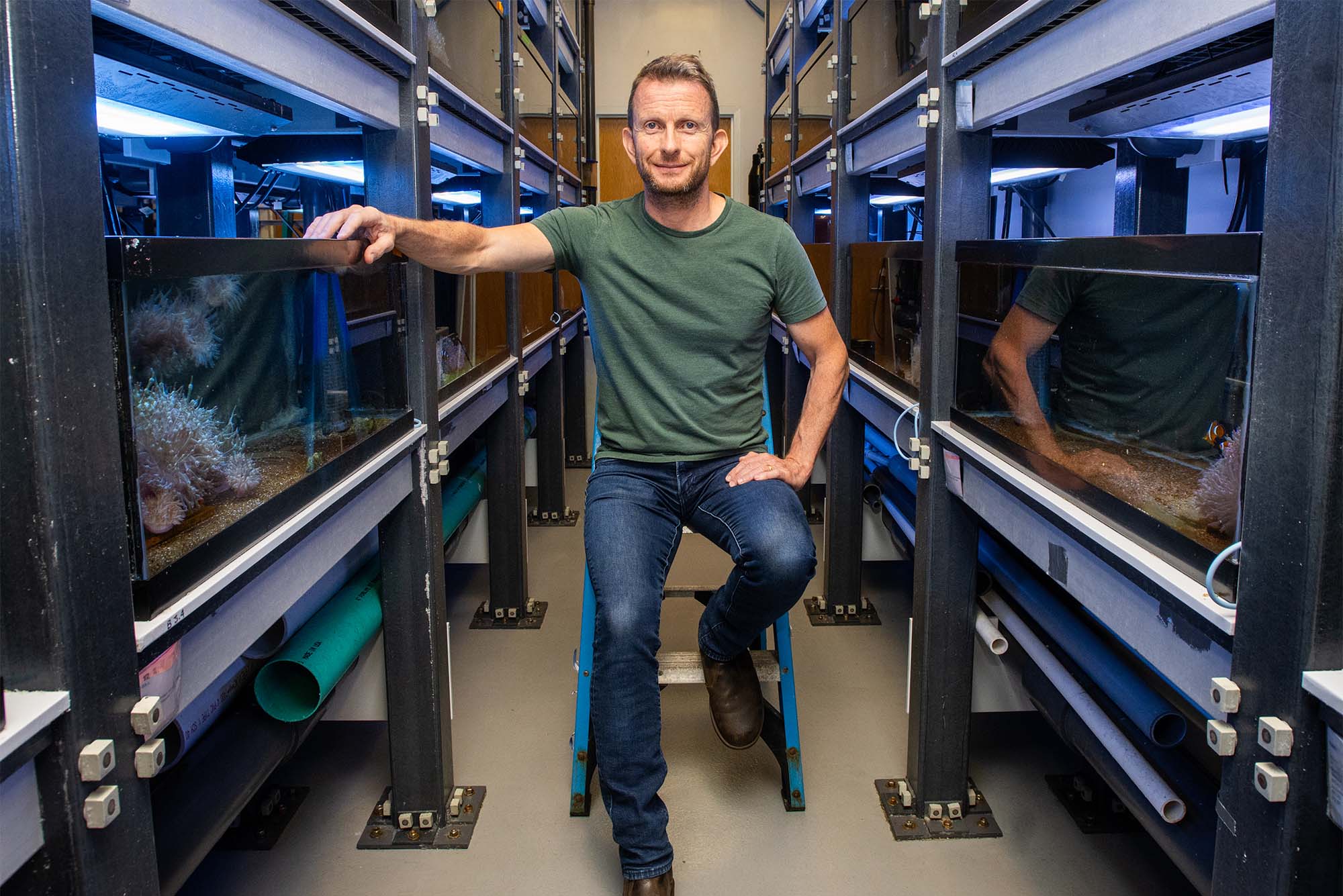
Emerson Conrad-Rooney Receives ESA 2024 Graduate Student Policy Award
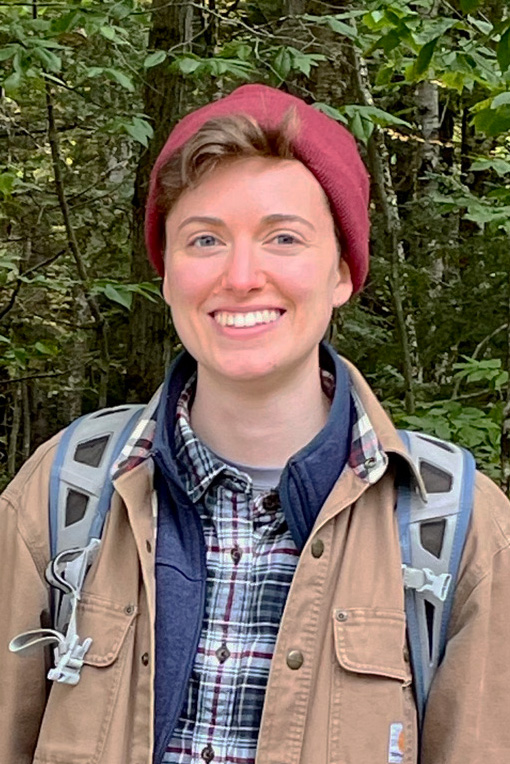 Emerson Conrad-Rooney, a Ph.D. candidate of the Templer Lab and a National Science Foundation (NSF) Graduate Research Fellow, received the Ecological Society of America (ESA) 2024 Graduate Student Policy Award.
Emerson Conrad-Rooney, a Ph.D. candidate of the Templer Lab and a National Science Foundation (NSF) Graduate Research Fellow, received the Ecological Society of America (ESA) 2024 Graduate Student Policy Award.
“The caliber of this year’s awardees, as has been true for awardees in our program since its inception, reflects a promising future for ecological research and policy advocacy. These exceptional students exemplify the Society’s commitment to nurturing innovative minds dedicated to addressing our most pressing scientific and environmental challenges”, said ESA President Shahid Naeem.
Conrad-Rooney’s dissertation research focuses on how climate change—both warmer summers and less snowpack in winter—impacts the ability of Northeastern forests to be carbon sinks. They are also a trainee in the Urban Biogeoscience and Environmental Health Program which is an NSF Research Traineeship program that trains students in science policy, science communication, urban ecology and public health. Through this program, they conducted an internship with the U.S. Global Change Research Program in 2022–2023, during which they analyzed nature-related content in the Fifth National Climate Assessment. Their long-term goal is to become a professor of forest ecology and bring experience in both ecology and science policy to their teaching and research.
Read more here.
Congratulations to Emerson Conrad-Rooney!
Anna Berenson Receives First Place in the PhD on Tap 3MT Competition

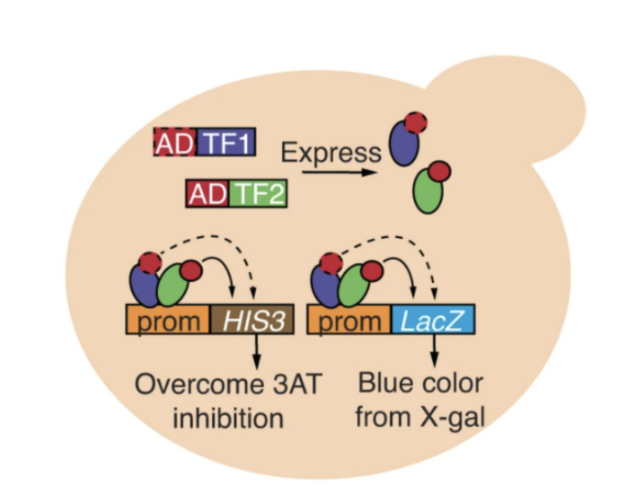
Anna Berenson, a PhD candidate of the Fuxman Bass Lab, received joint first place in the 2023 PhD on Tap 3MT Competition. The competition took place as part of PhD on Tap, which is a full day research showcase sponsored by the Office of the Associate Provost for Graduate Affairs and the Graduate School of Arts and Sciences.
In a project led by Anna, the Fuxman Bass Lab developed paired yeast one-hybrid assays to study DNA binding patterns of transcription factor pairs. Their work shows that extensive cooperativity and antagonism between transcription factors greatly affect their binding to gene promoters, and that viral proteins can modify the binding profiles of human transcription factors. You can check out their publication here.
Congratulations, Anna!
Explore the reasons behind the potential revival of Florida’s Coral Reef with Les Kaufman
Les Kaufman, a faculty member at BU's Biology Department, will deliver a presentation at the Phillip and Patricia Frost Museum of Science in Miami, titled "Breathing New Life into Florida’s Coral Reef" on Wednesday, November 8, 2023.
Dr. Kaufman aims to present an optimistic perspective on the future of Florida’s Coral Reef. Despite this year's ocean warming causing significant coral bleaching and mortality, compounded by the Stony Coral Tissue Loss Disease, there remains ongoing concern about the reef's future. However, amid these challenges, there is a glimmer of hope: Florida’s Coral Reef displays resilience, and robust conservation strategies are in motion.
Dr. Les Kaufman is a marine scientist, naturalist, and conservation biologist teaching at Boston University. His research focuses on ecosystem-based management in the ocean and great inland waters, particularly coral reef ecology and restoration, as well as climate change, marine food webs, fisheries, and aquaculture. During his presentation, Dr. Kaufman will narrate the journey, focusing on Mission: Iconic Reefs, a collaborative initiative led by NOAA that endeavors to rejuvenate and protect the reef.
Join us for the upcoming LIVE@Frost Science episode.